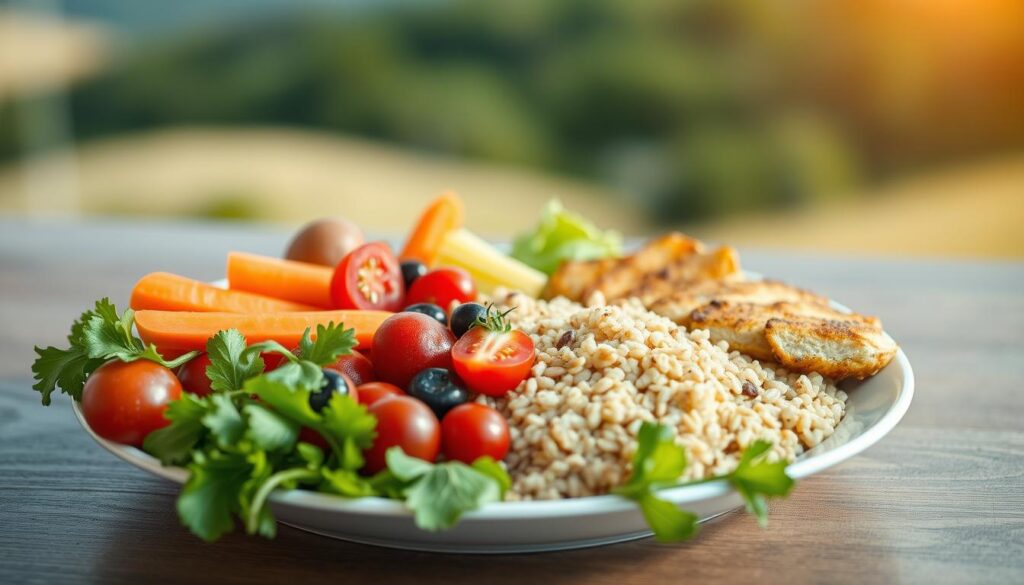How Balanced Nutrition Supports Wellness and Energy Levels.
As you go about your day, you need a balanced diet to stay active. A well-balanced diet is key for your health and energy. It helps your body work well and lowers the risk of diseases like type 2 diabetes and heart disease.
Table of Contents
Eating healthy foods like fruits, vegetables, whole grains, and low-fat dairy helps keep your blood pressure and cholesterol in check. Eating a variety of foods, including lean proteins, whole grains, and healthy fats, helps with weight management and keeps you energized all day. Making smart food choices is the first step to a healthy life.
By focusing on balanced nutrition, you get many benefits. You’ll see better physical and mental health, and you’ll live longer. A diet full of nutrients gives your body the energy it needs to function well and stay healthy.
Understanding the Fundamentals of Balanced Nutrition
To get a balanced diet, it’s key to know the basics of nutritional balance. A good diet has six main nutrients: proteins, carbs, fats, vitamins, minerals, and water. Each one is crucial for health, helping with everything from fixing tissues to giving energy.
Eating a variety of foods helps keep your diet balanced. For instance, whole grains should be a big part of your meals, focusing on high-fiber ones. Lean proteins are important for muscle health, and healthy fats like olive oil and fatty fish are great for you.

- Half of your plate should consist of fruits and vegetables
- Whole grains should be preferred over refined grains
- Lean proteins should be included in every meal
- Healthy fats should be prioritized
By sticking to these guidelines and eating a variety of nutrient-rich foods, you can reach nutritional balance. This supports your health and well-being.
The Impact of a Well-Rounded Diet on Your Body
Eating a well-rounded diet is key to staying healthy. By choosing whole foods, you can boost your energy by 30% and lower disease risk by 40%. A balanced meal plan gives you all the nutrients you need. This is important for a strong immune system and healthy weight.
Some big benefits of a good diet include:
- Lowering disease risk by 40%
- Boosting energy by 30%
- Improving mental health by 25%
- Helping with weight management by controlling hunger
Most Americans don’t eat enough fruits and veggies. By watching how your body reacts to food, you can create a balanced meal plan that works for you. Adding whole foods to your diet can greatly improve your health and well-being.

Essential Components of a Nutrient-Rich Diet
A well-planned nutrient-rich diet is key for good health. It’s important to eat whole, unprocessed foods. A healthy eating plan should have foods from all groups to get all nutrients.
Here are the main parts of a nutrient-rich diet:
- Proteins: essential for building and repairing tissues
- Healthy fats: necessary for brain function and hormone production
- Complex carbohydrates: provide sustained energy and fiber
Adding these to your balanced nutrition plan ensures you get all needed nutrients. Drink lots of water and avoid sugary drinks. With some planning, you can make a healthy eating plan that fits your life and helps you reach your wellness goals.
Creating Your Balanced Meal Plan
To make a balanced meal plan, think about what you need and like. With some planning, you can make a nutrition plan that fits your life. Studies show that 53% of Americans plan meals, cutting food waste by up to 33% and boosting fruit and veggie intake by 28%.
A good balanced meal plan has lots of whole foods like fruits, veggies, whole grains, lean proteins, and healthy fats. Try to eat less processed foods and sugars. Following nutrition guidelines helps make a meal plan that keeps you healthy.
Meal planning saves time, cuts down on waste, and makes you feel better. In fact, 71% of people who plan meals feel healthier and save 2-3 hours weekly. Adding a balanced meal plan to your day can bring these benefits and more.
Follow these tips and think about your needs to make a balanced meal plan for good health. Drink plenty of water, eat a variety of whole foods, and cut down on processed foods for a well-rounded nutrition plan.
Timing Your Meals for Optimal Energy
Timing is key when it comes to healthy eating. Eating the right foods at the right times boosts your energy. A good balanced nutrition plan includes meals and snacks spread out to keep your energy up.
Studies show that eating in a 12-hour window, like 7 a.m. to 7 p.m., helps regulate your body. It also supports weight loss. Plus, a balanced breakfast can lower blood pressure and cholesterol.
Breakfast: Starting Your Day Right
Eating breakfast kickstarts your metabolism and gives you energy. People who eat breakfast have lower blood sugar and hunger hormones. They also have lower insulin and triglycerides.
Lunch and Dinner Strategies
Finding the right balance for lunch and dinner is important. Some like a big lunch and small dinner for energy. Others prefer a small lunch and big dinner. The goal is to support your balanced nutrition goals.
Smart Snacking Options
Snacking is also key for energy. Choose healthy eating options like fruits, nuts, and veggies. They help keep your energy up and support your nutrient-rich diet.
Common Mistakes That Disrupt Nutritional Balance
Keeping a healthy nutritional balance can be tricky. A whole foods diet is key for getting the nutrients your body needs. But, many find it hard to follow this diet. One big mistake is eating too much sugar and saturated fat, found in many processed foods.
A good diet and nutrition plan with whole foods can help you avoid these errors. Tips include eating lots of fruits and veggies, adding lean proteins to meals, and cutting down on processed snacks. Being careful with your food choices and making a few changes can help you get the nutrients you need.
Here are some common mistakes to watch out for:
- Consuming too much sugar and saturated fat
- Eating too many processed foods
- Not incorporating enough whole foods into your whole foods diet
By avoiding these mistakes and focusing on a healthy nutritional balance, you can stay healthy and thrive. Always choose a whole foods diet and be careful with your diet and nutrition choices.
Superfoods to Enhance Your Wellness Journey
As you keep moving towards balanced nutrition and healthy eating, adding superfoods to your meals is key. These foods are packed with nutrients and can greatly improve your health. A diet rich in superfoods can boost your energy and overall health.
Some examples of superfoods include:
- Blueberries, which are rich in antioxidants and may help reduce the risk of serious health conditions
- Chia seeds, which contain antioxidants and may have anti-cancer properties
- Avocados, which are rich in heart-healthy fats and nutrients
It’s easy and tasty to add these superfoods to your meals. Try mixing blueberries into your oatmeal or yogurt. Or, use chia seeds as an egg substitute in your favorite dishes. With a bit of creativity, you can make healthy eating a daily habit and support your wellness journey.
Hydration’s Role in Balanced Nutrition
When you’re on a whole foods diet and balanced meal planhttps://naturalnicehealth.com/category/recipes/, don’t forget about hydration. It helps get rid of waste, prevents constipation, and keeps your gut healthy. Drink at least 8 cups of water a day. If you’re active or in a hot place, drink more.
A balanced intake of macronutrients (carbs, proteins, fats) keeps you energized and supports your metabolism. Eat complex carbs like whole grains, fruits, and veggies for lasting energy. Also, add lean meats, dairy, beans, and nuts to your diet for muscle repair and growth.
Some foods are very hydrating because they have lots of water. For example:
- Watermelon is 92% water, giving you hydration and vitamins A and C.
- Coconut water has potassium, magnesium, calcium, phosphorus, and sodium, key electrolytes.
By eating whole foods, planning your meals, and staying hydrated, you support your health and wellness. This ensures you get the most from your nutrition.
Adapting Your Diet to Your Lifestyle
Starting a balanced nutrition plan means thinking about your lifestyle. Whether you’re always on the move or busy with work, your diet needs change. A healthy eating plan that fits your life helps keep you energized and healthy.
A nutrient-rich diet with foods like fruits, veggies, and lean proteins is key. Simple changes like meal planning and mindful eating can make a big difference.
Personalized Nutrition Plans
Creating a diet plan that’s just for you is important. Athletes might need more protein, while busy professionals might prefer quick, healthy meals. Think about what you need and what you like.
- Eat a variety of whole foods, including fruits, vegetables, whole grains, and lean proteins
- Stay hydrated by drinking plenty of water throughout the day
- Limit your intake of processed and sugary foods
By tailoring your diet to your lifestyle, you can stick to a balanced nutrition plan. This supports your health and well-being.
Seasonal Approaches to Nutritional Balance
When you think about your whole foods diet, remember how seasons change. Using seasonal whole foods in your meals means you get the best taste and nutrition. This way of eating is good for you and the planet too.
Think about the nutrition guidelines that say eating a variety of foods is key. For instance, strawberries are sweeter and more nutritious in summer than in winter. Choosing seasonal foods helps the environment and supports local farmers.
Here are some tips for adding seasonal whole foods to your balanced meal plan:
- Find out what produce is in season where you live and plan your meals
- Visit local farmers’ markets or join a CSA to get fresh, seasonal food
- Try new recipes and ingredients to keep your diet exciting and varied
Adopting a seasonal approach to nutrition means your whole foods diet will be tailored to you and the planet. Always follow nutrition guidelines. Also, talk to a healthcare professional or registered dietitian for advice on a balanced meal plan that fits you.
Conclusion: Embracing a Lifetime of Nutritional Wellness
Starting your journey to balanced nutrition and healthy eating is a big step. It’s a commitment that lasts a lifetime. By choosing a nutrient-rich diet, you’ll see many benefits for your health.
These benefits include more energy, better skin, and a lower risk of diseases. A balanced diet is the secret to living your best life.
Small, steady changes can make a big difference. Start by adding more whole foods like fruits, veggies, lean proteins, and complex carbs to your meals. Drink plenty of water and think carefully about your snacks and how much you eat. With some planning and effort, you can make a nutrition plan that fits your life perfectly.
Enjoy the variety and richness of nature’s foods. They can nourish your body and mind. By focusing on balanced nutritionhttps://mybalancednutrition.com/, you’re investing in your health for the long term. You’re setting yourself up for a life full of energy and well-being.
FAQ
What is the importance of balanced nutrition?
Balanced nutrition is key for good health. It gives your body the nutrients and energy it needs. This supports your energy, physical health, mental health, and helps you live longer.
What makes a diet balanced?
A balanced diet has the right mix of nutrients. It includes carbs, proteins, fats, vitamins, and minerals. It focuses on whole foods, not processed or sugary ones.
How does a well-rounded diet impact the body?
A well-rounded diet boosts your energy and health. It improves your physical and mental well-being. Eating a variety of whole foods supports your overall health.
What are the essential components of a nutrient-rich diet?
A nutrient-rich diet includes proteins, healthy fats, and complex carbs. These provide the energy and building blocks your body needs.
How can I create a balanced meal plan?
To create a balanced meal plan, eat a variety of whole foods. Limit processed items and stay hydrated. Tailor your diet to your needs and likes.
How can I time my meals for optimal energy?
Timing your meals affects your energy. Eat a balanced breakfast and smart snacks. Use strategic lunch and dinner plans to keep your energy up.
What common mistakes can disrupt nutritional balance?
Too much sugar, saturated fat, and processed foods can upset your balance. Focus on whole foods and limit unhealthy ones for a balanced diet.
What superfoods can enhance my wellness journey?
Superfoods like plant-based foods, protein-rich foods, and energy boosters can improve your wellness. They add nutrients to your diet easily.
How important is hydration for balanced nutrition?
Hydration is vital for nutritional balance. Drink plenty of water and eat hydrating foods. This supports your health and wellness.
How can I adapt my diet to my lifestyle?
Adapting your diet to your lifestyle is crucial. Whether you’re active, work at a desk, or are a busy parent, a personalized plan helps. It meets your needs and helps you reach your wellness goals.
How can I incorporate seasonal whole foods into a balanced diet?
Using seasonal whole foods adds variety and nutrition to your diet. Adjust your meals to the seasons and include fresh, local produce. This supports your health and wellness.
Source Links
- https://www.nhsinform.scot/healthy-living/food-and-nutrition/eating-well/health-benefits-of-eating-well/ – Health benefits of eating well
- https://www.eastsideidealhealth.com/the-impact-of-nutrition-on-energy-levels/ – The Impact of Nutrition on Energy Levels – Eastside Ideal Health Redmond
- https://www.kimssunshine.co.in/blog/dietetics-and-nutrition/understanding-the-basics-of-a-balanced-diet-the-complete-guide-to-building-optimal-health/ – Understanding the Basics of a Balanced Diet: The Complete Guide to Building Optimal Health – Multispeciality Hospital
- https://betterme.world/articles/balanced-diet/ – The Fundamentals Of A Balanced Diet: Foods, Benefits, Weight Loss
- https://christysfoundation.org/the-power-of-nutrition-how-eating-well-can-transform-your-health/ – How Eating Well Can Transform Your Health – Christy’s Foundation
- https://www.rootsfoodgroup.com/blog/balancing-act-the-importance-of-meal-balance-for-health – Balancing Act: The Importance of Meal Balance for Health
- https://nourishstore.in/blog/the-importance-of-a-balanced-diet-crafting-well-rounded-meals-1?srsltid=AfmBOor64HNsiQWGRrNQxjfyqCBP9ODJtmlTU7CxK-_-jkVBySV9StO1 – The Importance of a Balanced Diet: Crafting Well-Rounded Meals
- https://www.rootsfoodgroup.com/blog/the-essentials-of-a-healthy-diet – The Essentials of a Healthy Diet
- https://www.helpguide.org/wellness/nutrition/healthy-diet – Healthy Eating: Choosing Healthy Foods for a Balanced Diet
- https://www.healthline.com/nutrition/how-to-eat-healthy-guide – Healthy Eating 101: Nutrients, Macros, Tips, and More
- https://www.rootsfoodgroup.com/blog/creating-a-balanced-meal-plan – Creating a Balanced Meal Plan
- https://www.mayoclinic.org/healthy-lifestyle/nutrition-and-healthy-eating/in-depth/healthy-meals/art-20546806 – Healthy meals start with planning
- https://www.health.com/nutrition/meal-timing-when-to-eat – Does When You Eat Matter for Your Health?
- https://www.healthline.com/nutrition/eat-before-workout – Pre-Workout Nutrition: What to Eat Before a Workout
- https://www.eatingwell.com/article/7826585/best-times-to-eat-for-weight-loss/ – These Are the Best Times to Eat for Weight Loss, According to a Dietitian
- https://www.webmd.com/diet/ss/slideshow-diet-mistakes – 10 Diet Mistakes and How to Avoid Them
- https://www.verywellhealth.com/nutrition-mistakes-that-hinder-muscle-growth-8749716 – 6 Nutrition Mistakes That Might Be Holding Back Your Muscle Gains
- https://www.businessinsider.com/5-common-mistakes-for-balanced-blood-sugar-dietitian-tips-2024-8 – A dietitian shares 5 common mistakes people make when they’re worried about blood sugar — and what to do instead
- https://www.realsimple.com/health/nutrition-diet/healthy-eating/top-superfoods-according-to-dietitians – Top 10 Superfoods Right Now, According to Registered Dietitians
- https://navitasorganics.com/blogs/navitaslife/the-ultimate-guide-to-stress-relieving-superfoods?srsltid=AfmBOoquaOG9mDYYr6rloVy7yraSNRUoXax_bWkAwW2Ghd_zIe4Fga6l – The Ultimate Guide to Stress-relieving Superfoods
- https://namawell.com/en-gn/blogs/journal/the-superfoods-that-boost-your-health?srsltid=AfmBOooIbX59NV_FVWxmj1CKBCLjECXBtdKmRz97acHDSjtcNe0RD7U2 – The Superfoods That Boost Your Health
- https://www.elizabethfinn.co.uk/care-advice/the-importance-of-good-nutrition-and-hydration/ – The Importance of good nutrition and hydration | Elizabeth Finn
- https://www.3dleisure.com/the-crucial-role-of-nutrition-and-hydration-in-wellbeing/ – The Crucial Role of Nutrition and Hydration in Wellbeing – 3d Leisure
- https://www.hdphysicaltherapy.com/hydration-and-nutrition-for-optimal-physical-performance/ – Hydration And Nutrition For Optimal Physical Performance
- https://www.healthline.com/nutrition/14-ways-to-stick-to-a-diet – 11 Simple Ways to Stick to a Healthy Diet
- https://www.heart.org/en/healthy-living/healthy-eating/eat-smart/nutrition-basics/aha-diet-and-lifestyle-recommendations – The American Heart Association Diet and Lifestyle Recommendations
- https://www.nhsinform.scot/healthy-living/food-and-nutrition/eating-well/eatwell-guide-how-to-eat-a-healthy-balanced-diet/ – Eatwell Guide: How to eat a healthy balanced diet
- https://www.schneckmed.org/blog/redefining-holiday-eating-a-holistic-approach-to-seasonal-well-being – Redefining Holiday Eating: A Holistic Approach to Seasonal Well-being
- https://www.webmd.com/diet/what-to-know-seasonal-eating – What to Know About Seasonal Eating
- https://cookingenie.com/content/blog/the-path-to-a-healthier-you-building-a-balanced-diet/ – The Path to a Healthier You: Building a Balanced Diet
- https://pmc.ncbi.nlm.nih.gov/articles/PMC10973102/ – How the intricate relationship between nutrition and hormonal equilibrium significantly influences endocrine and reproductive health in adolescent girls
- https://www.mrmed.in/health-library/health-care/benefits-of-eating-healthy?srsltid=AfmBOooqDpm2BtO3OYtU4cf2U36WRoJTrDfnoShZBnEKUPQNld09xVVO – What’s The Best Place To Buy Cancer Medicines? | MrMed

